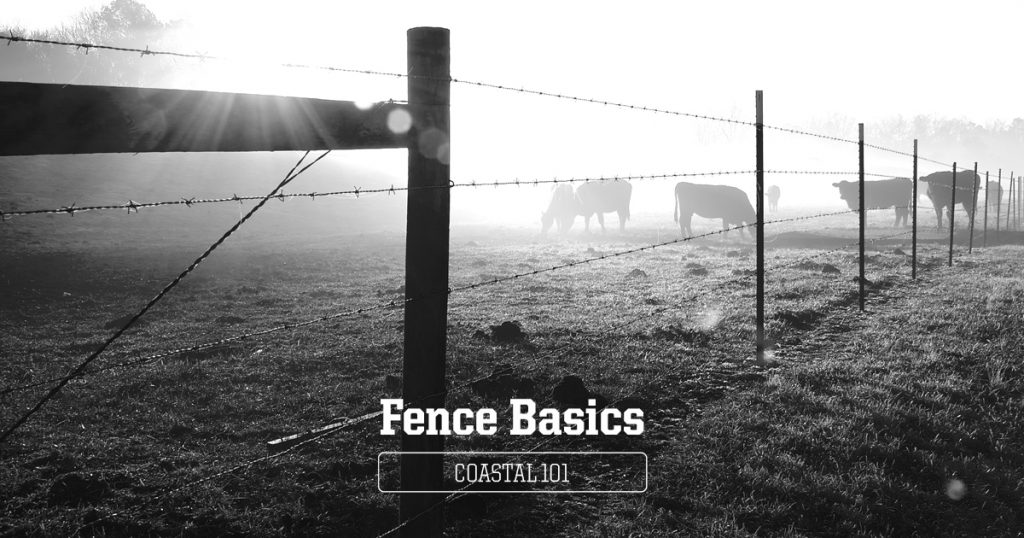Fence Building Basics
April 14, 2016
First-Time Fence Building Tips
If you have acreage, and particularly livestock, fences are probably on your mind…either mending or building. Running a fence over acres or even miles successfully requires thought, planning and effort.
If you’re new to fence building, a terrific first step is to head to your local Coastal store and seek out one of our building and fence specialists. With their experience and expertise they’ll ask you the appropriate questions to help you decide what materials are best suited for your project.
Get Coastal 101 In Your Inbox!
Looking for more details? We're always working on in-depth tutorials that go deeper into the specifics of important topics (like fence building). Sign up today to receive Coastal 101 tutorials as we publish them.
Coastal has miles of fencing, loads of wood and metal posts and all the tidbits you need to get your fence whipped into shape.
Materials & Tools
Here's a quick look at a few things you'll need to get your project going. There's more than just this list, but this is a good place to start:
- A helper. It’s nearly impossible to build a long wire fence by yourself. So grab a friend, ideally one who likes to work hard.
- Wire. The kind will depend on the kind of fence you want. Choices include barbed, field fence, horse fence, electric, woven, high-tensile (coated or uncoated), vinyl fencing and specialty fencing (like chain-link or hog wire).
- T-posts (metal) or wooden posts, depending on your needs.
- Post-Pounder or Post Hole digger (manual – by hand or gas-powered – much easier).
- Wire strainers, fasteners.
- Fence stretcher.
- Fence pliers, crow bar, and gloves (very important).
- Battery, solar panel (for charging battery) and insulators for electric fence
Know Your Boundaries
Before you even begin building it’s very important to be sure of where your property line exists. You’ll want to build inside of the line (on your side) of the property line. Some states have strict guidelines about bordering with fence so it’s a prudent measure to check with your state or county to make sure there aren’t special guidelines you need to follow.
Basic Overview of Steps
You've got a basic idea of the tools and materials you'll need, you know where your property line is, now it's time to think about the steps to fence building.
Setting the Posts – The posts are the foundation of the fence and if the posts aren’t set correctly, your fence will never be stable or long-lasting. There are different posts, including corner posts, brace/slave posts and line posts. Properly setting your posts in the ground (whether metal or treated wood) is critical to having the sturdiest fence possible.
Building the Corners – Constructing corners properly and at the right angle is essential. Because of the high tension on a long run of fence, the corner posts take a lot of stress and must be set correctly and stout to constantly endure that pressure. Cross bars are often used for added stability and the proper placement of brace wires is also key.
Stretching the Wire – Creating a straight and taut wire will determine if your fence is effective or not. Too loose and livestock will go under or simply through the fence. They can also become entangled which is dangerous to them. Using a fence stretcher will ensure the proper tightness for your wire and the ultimate stability of your fence.
Attaching Wire - This is an important step but different when attaching wire to wooden or metal posts. Staples are often used for wood whereas fasteners are used for wire and insulators for electric fences. Making sure the fasteners are tight and secure is the last important step to have a tight, secure fence that can last for years (sometimes up to 40 or 50!)
Coastal carries everything you need for fence building, from wire, to wood, to tools, to outdoor clothing to the advice & expertise from our fencing specialists. So whether it’s mending or building your fence for the first time, come see us. We’d like nothing better than to partner with you in keeping your livestock in and the predators out.
When thinking about fencing, think Coastal.









